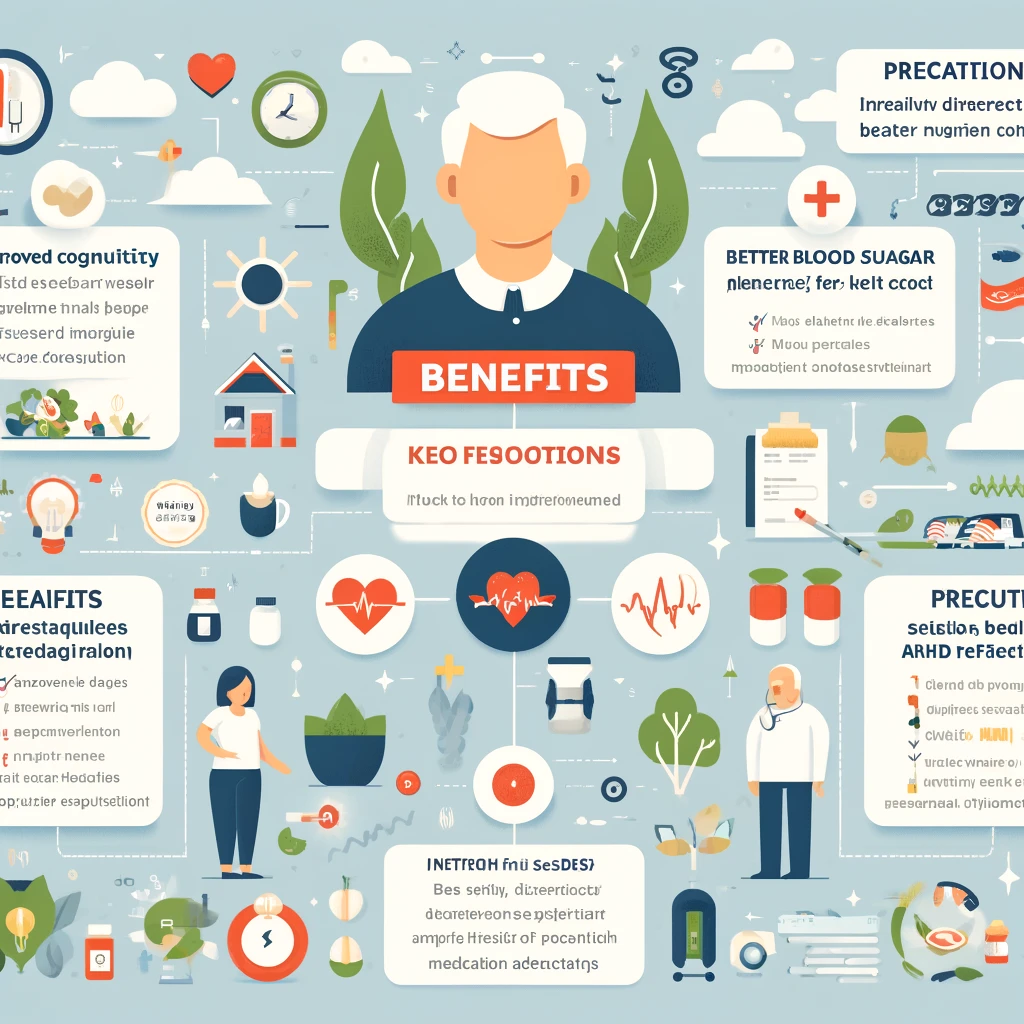Keto for Seniors Benefits and precautions

Keto for Seniors: Benefits and Precautions
Alright, let’s get straight to the point. You’ve probably heard the buzz about the ketogenic diet and its benefits for weight loss and overall health. But how does this high-fat, low-carb diet stack up for seniors? Is it safe? Can it really help with age-related health issues? Buckle up, because we’re diving deep into the benefits and precautions of the keto diet for older adults.
The Basics: What is the Keto Diet?
The ketogenic diet, or keto for short, is a high-fat, moderate-protein, and very low-carb diet that aims to put your body into a state of ketosis. In ketosis, your body burns fat for fuel instead of carbohydrates, producing ketones which are used as an energy source. The typical macronutrient breakdown is about 70-75% fats, 20-25% protein, and 5-10% carbohydrates.
Benefits of Keto for Seniors
1. Weight Management One of the primary reasons seniors turn to the keto diet is for weight management. As metabolism slows with age, maintaining a healthy weight can become challenging. Keto can help by reducing insulin levels and encouraging the body to burn stored fat. This not only helps with weight loss but also reduces the risk of obesity-related health issues like heart disease and diabetes (Perfect Keto, 2021).
2. Improved Cognitive Function As we age, cognitive decline becomes a significant concern. The keto diet has shown promise in enhancing brain function and protecting against neurodegenerative diseases like Alzheimer’s. Ketones are a more efficient fuel for the brain, providing a steady energy source that can improve mental clarity and focus (Discovery Village, 2021).
3. Better Blood Sugar Control For seniors with diabetes or pre-diabetes, the keto diet can be particularly beneficial. By drastically reducing carb intake, keto helps stabilize blood sugar levels and improve insulin sensitivity, reducing the need for medication (Great Senior Years, 2021).
4. Enhanced Energy Levels Switching to a fat-based energy system can provide more consistent energy levels throughout the day, which is crucial for seniors who may experience energy dips. This sustained energy can improve overall quality of life and activity levels (Keto Boss, 2024).
5. Reduced Inflammation Chronic inflammation is linked to numerous age-related diseases. Ketones have anti-inflammatory properties that can help reduce inflammation in the body, potentially alleviating symptoms of arthritis and other inflammatory conditions (Perfect Keto, 2021).
Precautions and Risks
1. Nutrient Deficiencies The restrictive nature of the keto diet can lead to deficiencies in essential nutrients, particularly vitamins and minerals found in fruits, vegetables, and whole grains. Seniors need to ensure they are getting enough micronutrients by incorporating nutrient-dense, low-carb vegetables and possibly taking supplements (Keto Daily, 2021).
2. Loss of Muscle Mass Maintaining muscle mass is crucial for seniors, but the keto diet can sometimes result in muscle loss if protein intake is not adequately managed. Seniors should focus on consuming enough protein and engaging in regular strength training exercises to preserve muscle mass (SilverSneakers, 2021).
3. Heart Health Concerns While keto can improve cholesterol levels for some, it can increase LDL (bad) cholesterol in others. Seniors with existing heart conditions should monitor their cholesterol levels closely and focus on healthy fats like avocados, nuts, and olive oil rather than saturated fats (On and Off Keto, 2021).
4. Bone Health There is some evidence that the keto diet may negatively impact bone density due to the acidifying effects of ketones. Seniors should ensure they get enough calcium and vitamin D and engage in weight-bearing exercises to support bone health (Getting Old and Fit, 2021).
Tips for Seniors on Keto
1. Consult with a Healthcare Professional Before starting the keto diet, it’s crucial for seniors to consult with a healthcare provider to ensure it’s a safe and appropriate choice given their individual health conditions (On and Off Keto, 2021).
2. Focus on Nutrient-Dense Foods Incorporate a variety of low-carb, nutrient-rich vegetables to ensure a balanced intake of vitamins and minerals. Leafy greens, broccoli, and cauliflower are excellent choices (Keto Boss, 2024).
3. Stay Hydrated The keto diet can lead to increased water loss, so staying hydrated is essential. Seniors should aim for at least eight cups of water per day and consider electrolyte supplements to avoid dehydration (Great Senior Years, 2021).
4. Monitor Blood Sugar and Cholesterol Levels Regular monitoring of blood sugar and cholesterol levels is crucial to adjust the diet as needed and ensure overall health is maintained (Discovery Village, 2021).
5. Gradual Transition Easing into the keto diet gradually can help minimize the side effects such as the keto flu, which includes symptoms like fatigue and nausea. Slowly reducing carb intake over a few weeks allows the body to adapt more comfortably (Perfect Keto, 2021).



